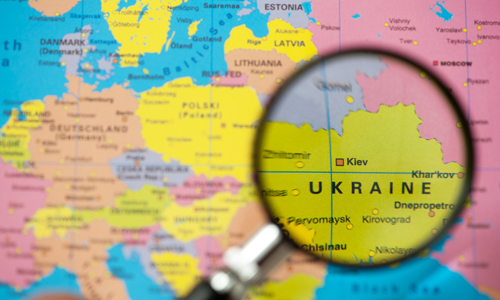To consider the long and contentious connections of Crimea, Ukraine and Russia and the dangers for them and the wider world going forward, For Your Ears Only was joined by Dr. Steven Miner, Director of Ohio University’s Contemporary History Institute and an expert on Russian Soviet and Eastern European history. His books include Between Churchill and Stalin and Origins of the Grand Alliance and Stalin’s Holy War.
“I think that people are not fully aware that Russia still remains a multinational country. It’s not a unified nation-state. And there are separatist areas within Russia itself,” Miner said. “I think one of the concerns on the part of Putin is he runs an authoritarian government. He’s cracked down on demonstrators in his own country, and he’s concerned that if Ukraine is allowed to slip away from Moscow’s control and domination, this kind of power from below could spread to Russia itself and Russia could disintegrate….
“When it comes to Putin himself, we’re all guessing because we don’t know exactly what he’s aiming at. He could have maximalist aims, and he could have minimalist aims. The maximalist could be to annex Eastern Ukraine or Ukraine itself along with the Crimea. Or it could be that he’s using this as a bargaining chip to have some kind of say over what an independent or a quasi-independent Ukraine could do. … On the other hand, he could be going for the whole of the Ukraine, in which case we’re in for some trouble for a long time.
“Future indications of where he might go can be seen in Georgia, where he’s still hanging onto Abkhazia, where he’s still hanging onto Ossetia, and also in Transnistria … which is also occupied by Russian troops. So there’s precedent for what he’s doing in Crimea.”
Asked what would be the impact on Crimea and its breakaway referendum, Miner responded, “The future lasts a long time. And you’ll remember that the Baltic states were incorporated into the Soviet Union back in 1940, and that seemed to be eternal and we seemed to think we had to accept that. But we never recognized it. And ultimately they were able to re-establish their independence. So I think not recognizing something is a long-term marker that ‘OK, you’ve got this, you’ve got the power to enforce it, but we don’t accept it.’ And the worm will turn eventually.”
Miner also was asked about China’s shifting policy on the Ukraine. “They’re pulling close to Russia because they have their own problems with the United States, and both Russia and China think that America is past its prime,” Miner said. “Right now, I don’t think anybody—even the most formidable of presidents—could have a whole lot of tools in his tool bag to force the Russians to act quickly to disgorge Crimea.”


















Comments